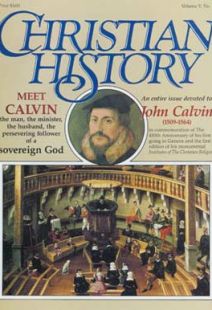John Calvin: Did You Know?
TO SIGNIFY HIS WILLINGNESS to sacrifice all to the service of the Lord, Calvin’s seal pictured a burning heart in a hand and was accompanied by this motto: “Promptly and Sincerely in the work of God.”
Calvin’s early training was as a lawyer and his first published book was an academic commentary on the ancient philosopher Seneca.
Although neither were Protestants, both Calvin’s father and his brother Charles were excommunicated from the Roman Catholic Church.
Calvin was not granted citizenship in Geneva until five years before his death in 1564. He had been the city’s most famous person for over twenty years.
Calvin’s association with the Swiss city of Geneva was not part of his plans. He visited the city only because of a detour to avoid the hostilities of a war raging between the Holy Roman Emperor, Charles V, and the King of France, Francis I. Calvin had intended to remain in Geneva a single night before resuming his travel to Strasbourg. John Knox, the Scottish Reformer, visited Calvin’s Geneva. He wrote to an English friend saying of the city, it “is the most perfect school of Christ that ever was in the earth since the days of the Apostles.”
Although he never met the great German Reformer, Martin Luther, Calvin esteemed him very highly. To his friend Heinrich Bullinger, Calvin wrote: “even if he [Luther] were to call me a devil I should still regard him as an outstanding servant of God.”
Calvin married a widow with two children. After her death in 1549, he raised her two children as his own.
Calvin encouraged congregational psalm-singing in the church at Geneva. Calvin viewed music as a gift of God, and even put to music a number of the psalms himself.
Nearing his journey’s end, Calvin gave strict instructions that he be buried in the common cemetery with no tombstone. He wished to give no encouragement to those who might make it a Protestant shrine. Today, his grave site is unknown.
Calvin did not like to waste a minute of his time. Even on his death-bed, his friends pleaded with him to refrain from his labors. He replied: “What! Would you have the Lord find me idle when he comes?”
Once when Calvin was sending a letter to his close friend Pierre Viret by one of a pair of students, he noticed that the other was a little jealous at not being the messenger. Calvin quickly dashed off another letter to Viret. The letter contained only the request that Viret pretend it was a valuable letter.
During the course of his ministry in Geneva, lasting nearly twenty five years, Calvin lectured to theological students and preached an average of five sermons a week. This was in addition to writing a commentary on nearly every book of the Bible as well as numerous treatises on theological topics. His correspondence fills eleven volumes.
By the Editors
[Christian History originally published this article in Christian History Issue #12 in 1986]
Next articles
Idelette: John Calvin’s Search for the Right Wife
You don’t look to the life of John Calvin for humor, but Calvin’s quest for a wife would make grist for a twentieth-century situation comedy.
William J. PetersenChristian History Timeline: John Calvin
Chronology of key events associated with the life of Calvin.
the EditorsJohn Calvin: A Gallery of Calvin’s Supporters and Opponents
Who was who in Calvin's world.
the EditorsSupport us
Christian History Institute (CHI) is a non-profit Pennsylvania corporation founded in 1982. Your donations support the continuation of this ministry
Donate



